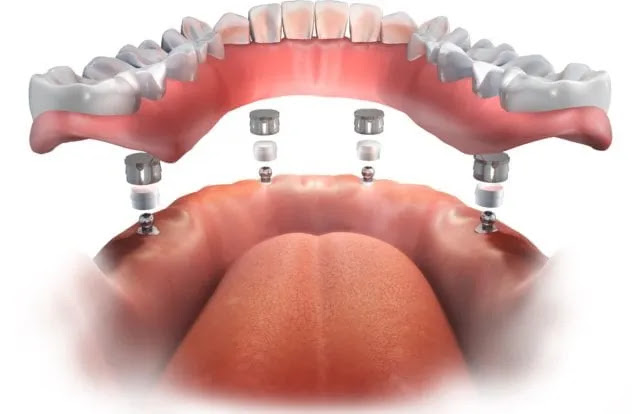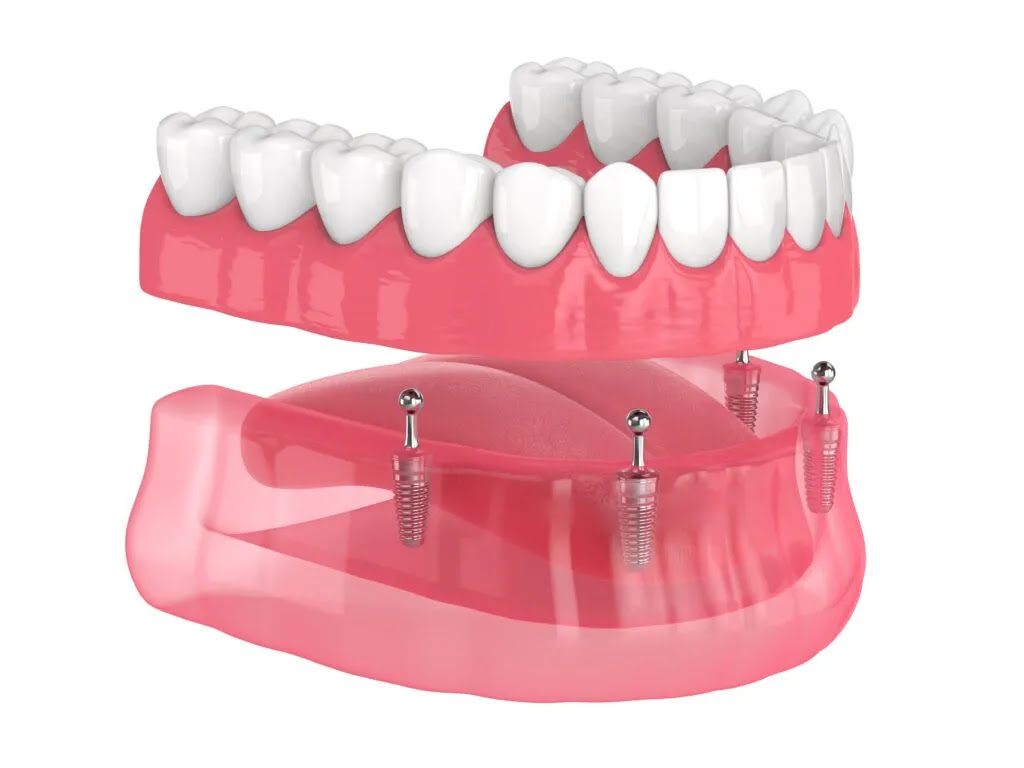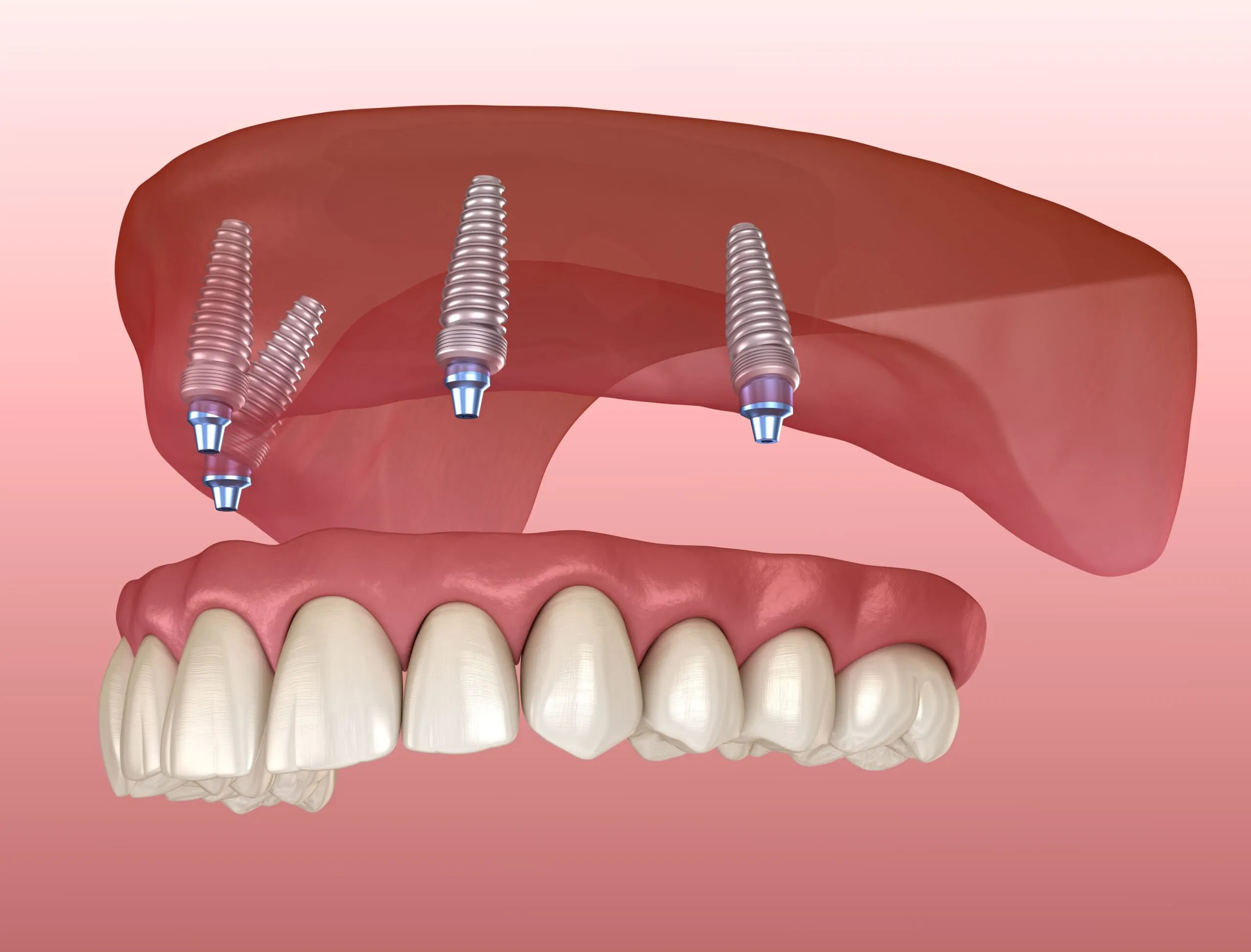
Implant-supported overdentures are revolutionizing the way we think about denture solutions, offering a beacon of hope for those struggling with the limitations of traditional dentures. This innovative dental technology blends the reliability of dental implants with the flexibility of removable dentures, creating a solution that not only enhances oral functionality but also restores confidence in one’s smile. Whether you’re considering an upgrade from conventional dentures or seeking a more stable and comfortable alternative, implant-supported overdentures are becoming the preferred choice for achieving a seamless, natural-looking smile.
Initial Consultation and Treatment Planning:
Healing and Osseointegration:
Attachment of the Overdenture:
Follow-Up and Maintenance:
Implant-supported overdentures are suitable for many people who have lost most or all of their teeth but have enough bone in their jaw to support implants. However, they might not be right for everyone. Conditions such as uncontrolled diabetes or certain heart diseases may affect the healing process, making dental implants less successful.
An ideal candidate for implant-supported overdentures is someone who is looking for a more stable and comfortable alternative to traditional dentures but meets certain criteria that ensure the success of the dental implants. Here are the key characteristics of an ideal candidate:
Sufficient Bone Density
Good Oral and Overall Health
Non-smokers or Willing to Quit
Missing Multiple Teeth
Unsatisfied with Traditional Dentures
Willingness to Commit to the Process
Adequate Oral Hygiene Practices
Realistic Expectations
Understanding Implant-Supported Overdentures
Implant-supported overdentures are a type of removable denture that is supported by and attached to implants. A dental implant is a small titanium post that is surgically inserted into the jawbone, where it acts as a substitute for a tooth root. Unlike conventional dentures that rest on the gums, implant-supported overdentures clip or snap onto these implants, providing superior stability, comfort, and functionality. There are two primary types of implant-supported overdentures, categorized based on how they attach to the implants:
Bar-Retained Overdentures:
In this system, a metal bar that follows the curve of the jaw is attached to two to five implants that have been placed in the jawbone. The overdenture fits over the bar and is secured with clips or other types of attachments. This setup provides a stable foundation for the overdenture while distributing the force of biting and chewing evenly across the implants.
Ball-Retained Overdentures (Stud-Attachment Overdentures):

This type involves each implant in the jaw having a ball-shaped (male) attachment that fits into sockets (female attachments) on the overdenture. This “ball and socket” mechanism allows for the denture to snap firmly into place, providing a secure fit while still being easy to remove and clean.
Other types of implant-supported overdenture attachments can include magnetic and locator. Magnetic attachments work by utilizing magnets embedded both in the dental implant abutment and the overdenture itself. Locator attachments involve a mechanical locking system where the overdenture snaps onto locator abutments attached to the implants.
Benefits of Implant-Supported Overdentures
Implant-supported overdentures offer numerous advantages over traditional dentures, including:
Improved Stability and Comfort:
Implant-supported overdentures are anchored directly to dental implants, significantly reducing the movement and slippage that can occur with traditional dentures. This stability is especially noticeable during eating and speaking. They are also tailored to fit the individual’s mouth precisely, offering a more comfortable and natural feeling compared to traditional dentures that may not fit as securely (or comfortably) over time.
Superior Chewing and Speech:
The stability provided by implants allows for a better bite force, enabling wearers to eat a wider range of foods, including those that are harder or require more chewing. This can lead to improved nutrition and overall health. Not only that, but implant-supported overdentures also result in clearer, more natural speech due to a lack of denture slipping and clicking while talking.
Enhanced Oral Health:
Traditional dentures can sometimes lead to bone loss in the jaw over time. Dental implants stimulate the jawbone, mimicking the root of a natural tooth. This stimulation helps to maintain jawbone density and prevent the bone loss that often occurs with traditional dentures. Additionally, implant-supported dentures typically cause less gum irritation due to their stability, which helps to maintain overall gum health. Finally, implant-supported dentures can enhance your oral health by improving your oral hygiene. Since these overdentures can be removed, it allows for better access to the implants and surrounding gum tissue, making it easier to maintain good oral hygiene practices.
Increased Confidence:
The fear of dentures falling out or moving can be embarrassing and limit social interactions. Implant-supported overdentures offer peace of mind, allowing wearers to laugh, talk, and eat in public with confidence. Implant-supported overdentures also support the facial structure, preventing the sunken appearance that can occur with bone loss associated with traditional dentures. This can make wearers look younger and feel better about their appearance.
Longevity and Cost-Effectiveness:
Implant-supported overdentures, with proper care and maintenance, can last many years. While the initial cost may be higher than traditional dentures, their durability and the reduced need for adjustments or replacements can make them more cost-effective in the long run.
The Procedure
Implant-supported overdentures, with proper care and maintenance, can last many years. While the initial cost may be higher than traditional dentures, their durability and the reduced need for adjustments or replacements can make them more cost-effective in the long run.
The journey begins with a thorough examination of the patient’s oral health, including dental history, current dental needs, and overall health considerations. Advanced imaging techniques, such as X-rays or CT scans, are then used to evaluate bone density, the shape of the jaw, and to plan the implant placement. Based on the initial evaluation, a personalized treatment plan is developed next. This plan considers the number of implants needed, their placement, and the type of overdenture suitable for the patient.
Implant Placement:

If you are a candidate, the next step is the surgical placement of the dental implants into your jawbone. The number of implants required can vary depending on the individual case and the type of overdenture. In cases where same-day dental implants are feasible, a temporary, but functional and aesthetic, overdenture is attached to the implants immediately after their placement. This will allow you to have new permanent teeth in ONE day.
After implant placement, a period of healing is necessary for osseointegration to occur, where the implant fuses with the jawbone. This can take several months, depending on individual healing rates and the specific case. Your dental implant specialist will provide you with specific instructions to follow during this healing period to minimize the risk of postoperative complications.
Once osseointegration is complete and the implants are firmly anchored in the jawbone, the permanent overdenture is fitted and attached to the implants. This step may involve several fittings to ensure the best comfort and function. The denture snaps onto the implants, providing a secure fit that prevents slipping or movement. In situations where immediate loading is part of the treatment plan, the temporary overdenture will be replaced with the permanent one shortly after implant placement.
Ongoing dental visits are crucial to monitor the health of the implant sites, the condition of the overdenture, and to perform any necessary adjustments. Patients will receive instructions on caring for their new teeth, emphasizing the importance of regular cleaning, flossing, and the maintenance of overall oral health.
Are You a Candidate for Implant-Supported Overdentures?
The individual must have enough jawbone density to support the dental implants. Bone density is crucial for the success of the implant as it needs to fuse with the bone through a process called osseointegration.
Candidates should have good oral health, free from periodontal disease, and overall health that supports healing and reduces the risk of infection. Chronic conditions such as uncontrolled diabetes or autoimmune diseases may affect healing and the success of the implants.
Smoking significantly affects healing and increases the risk of implant failure. Ideal candidates are non-smokers or those willing to quit smoking before the procedure and throughout the healing process.
health.
Implant-supported overdentures are designed for individuals missing most or all of their teeth in one or both jaws, providing a more stable and functional solution than traditional dentures.
Individuals who currently have traditional dentures but are unhappy due to discomfort, poor fit, or difficulty eating and speaking may find implant-supported overdentures a superior alternative.
The process of getting implant-supported overdentures involves multiple steps and visits to the dentist or oral surgeon over several months. Ideal candidates are willing and able to commit to the entire process, including the surgical procedures and necessary follow-up appointments.
Maintaining good oral hygiene is crucial for the longevity of implant-supported overdentures. Candidates should be committed to regular brushing, flossing, and dental check-ups.
g, flossing, and the maintenance of overall oral health.
While implant-supported overdentures offer many benefits, it’s important for candidates to have realistic expectations about the outcomes, maintenance, and potential challenges of having dental implants.
Determining if someone is a candidate for implant-supported overdentures involves a thorough evaluation by a dental professional. If you’re considering implant-supported overdentures, schedule a consultation with Dr. Kogan to understand if this solution is suitable for your specific needs.